JAPANESE SWORDSWOMEN IV:
CRIMSON BAT, THE BLIND SWORDSWOMAN
I first saw the Crimson Bat series on a big screen at the old Kokusai Theater in Seattle in the 1970s. For many years poor VHS copies were in circulation, apparently made illegally off the subtitled 35 mm prints. More recently bad transfers have been on the black market in England & Europe, sometimes dubbed in English for the worst versions. A subtitled letterbox DVD set exists, but the quality is reportedly poor, I haven't seen them myself. It's unfortunate this series isn't an easy series to lay hands on.
In Crimson Bat: The Blind Swordswoman (also known by the pirated video title Blind Oichi Story: Red Bird of Flight) we learn how the Oichi is abandoned by a heartless mother, blinded in a snowstorm, raised by a kindly man who is subsequently killed, then encounters a masterless samurai who trains her for vengeance, which she ultimately achieves before shuffling off toward the promise of further adventures.
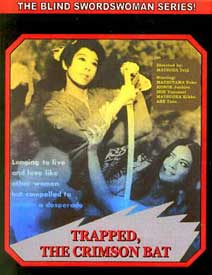 In the immediate sequel Trapped, The Crimson Bat Oichi has taken to the life of a bounty hunter, pursuing a whip-weilding villainess who also uses poisonous snakes for weapons. At one point Oichi nearly retires from her wandering life to find happiness in domesticity, but that can't last or the movie would be over, so it's back to the girl-fight, sword vs whip. The action is more toward the acrobatic type, not the credible swordfighting one gets in a really good samurai movie. In the immediate sequel Trapped, The Crimson Bat Oichi has taken to the life of a bounty hunter, pursuing a whip-weilding villainess who also uses poisonous snakes for weapons. At one point Oichi nearly retires from her wandering life to find happiness in domesticity, but that can't last or the movie would be over, so it's back to the girl-fight, sword vs whip. The action is more toward the acrobatic type, not the credible swordfighting one gets in a really good samurai movie.
Watch Out, Crimson Bat had a UK pirated video with the title Samurai Woman though blind Oichi is not of the samurai class & fights with one sword, not two.
Because Oichi is underneath it all a normal girl cursed by her killing skill, she makes a try at motherhood when she encounters orphans, & a samurai falls in love with her, but any dream of a family life can't work out, or the film would be over. It all climaxes in a one-against-all battle as Oichi slaughters all the bad guys.
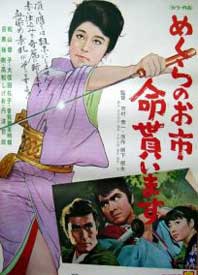 In the final film of the series Oichi, Wanted Dead or Alive a bounty is placed on our blind heroine's head & that provides the excuse for action scenes. The sword vs. sickle & chain is particularly good in this episode. A samurai (played by Tetsuro Tamba, the only big star to appear in the whole series) has been hired to harrass a fishing village, so there's a worthy opponent amidst the many who will fall as Oichi stands up for the village. In the final film of the series Oichi, Wanted Dead or Alive a bounty is placed on our blind heroine's head & that provides the excuse for action scenes. The sword vs. sickle & chain is particularly good in this episode. A samurai (played by Tetsuro Tamba, the only big star to appear in the whole series) has been hired to harrass a fishing village, so there's a worthy opponent amidst the many who will fall as Oichi stands up for the village.
The series was commercially viable but no further episodes were produced because the star, Yoko Matsuyama, decided to retire & raise a family.
She played blind Oichi as very ladylike, polite, impeccably coiffed & always in fine kimono, making it seem unlikely she's been on the road any length of time. She is not particularly sexy, unlike Lady Snowblood, or the Dragon Tattooed Lass, both played by Kaji Meiko in the prime of her great beauty, & which includes an additional swordswoman who is blind, revenge-seeking Aiko Goda played with horrific menace by Hoki Tokuda, totally opposite of Oichi's archly kind nature.
To make Oichi motherly (literally taking care of children in Watch Out, Crimson Bat) rather than sensual or sexy seems to have been very intentional. For sex appeal we get co-starring femme fatales among Oichi's primary enemies.
Oichi's pathos derives mainly from her inability to end up barefoot & pregnant in the kitchen, probably the only Japanese swordswoman of cinema to harp on this issue to such excess, though it's of passing concern to most such characters.
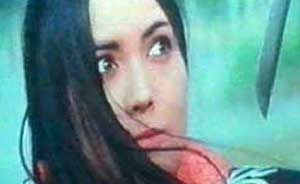 The films are overall rather mediocre. Most viewers regard the Crimson Bat as a bad imitation of the Zatoichi series, & they're right to do so. The films were based on a comic book series created by Yoko Matsuyama's husband, Teruo Tanashita, but obviously Zatoichi was the chief inspiration, & the Crimson Bat series never really found its own identity. The films are overall rather mediocre. Most viewers regard the Crimson Bat as a bad imitation of the Zatoichi series, & they're right to do so. The films were based on a comic book series created by Yoko Matsuyama's husband, Teruo Tanashita, but obviously Zatoichi was the chief inspiration, & the Crimson Bat series never really found its own identity.
Unlike the lady yakuza series Red Peony Gambler, Crimson Bat lacks a certain toughness. She acts girlishly frail & apologetic about things, so that she just came across as a wuss, even though we do always know it will be bad news for whoever refuses her unwarranted apologies.
By comparison, when Junko Fuji as the Red Peony Gambler bows in that "submissive gambler" posture of apology, she still looks like a wild animal taut with power. Crimson Bat has her moments but no one put nearly enough thought into these films.
As an odd aside, she's nowhere within the film actually called the Crimson Bat, but she's been known by that name to American film fanatics because the name was imposed on her in the American market 30 years ago when the first subtitled film prints arrived in the states.
copyright © by Paghat the Ratgirl
|
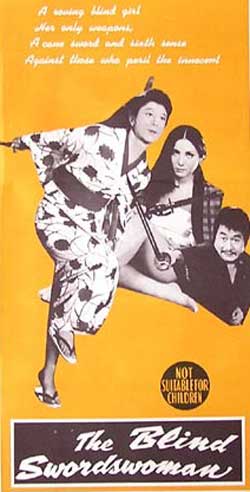
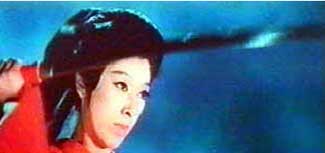
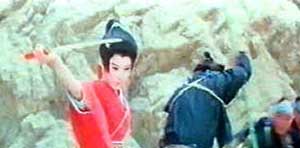

 In the final film of the series Oichi, Wanted Dead or Alive a bounty is placed on our blind heroine's head & that provides the excuse for action scenes. The sword vs. sickle & chain is particularly good in this episode. A samurai (played by Tetsuro Tamba, the only big star to appear in the whole series) has been hired to harrass a fishing village, so there's a worthy opponent amidst the many who will fall as Oichi stands up for the village.
In the final film of the series Oichi, Wanted Dead or Alive a bounty is placed on our blind heroine's head & that provides the excuse for action scenes. The sword vs. sickle & chain is particularly good in this episode. A samurai (played by Tetsuro Tamba, the only big star to appear in the whole series) has been hired to harrass a fishing village, so there's a worthy opponent amidst the many who will fall as Oichi stands up for the village. The films are overall rather mediocre. Most viewers regard the Crimson Bat as a bad imitation of the Zatoichi series, & they're right to do so. The films were based on a comic book series created by Yoko Matsuyama's husband, Teruo Tanashita, but obviously Zatoichi was the chief inspiration, & the Crimson Bat series never really found its own identity.
The films are overall rather mediocre. Most viewers regard the Crimson Bat as a bad imitation of the Zatoichi series, & they're right to do so. The films were based on a comic book series created by Yoko Matsuyama's husband, Teruo Tanashita, but obviously Zatoichi was the chief inspiration, & the Crimson Bat series never really found its own identity.